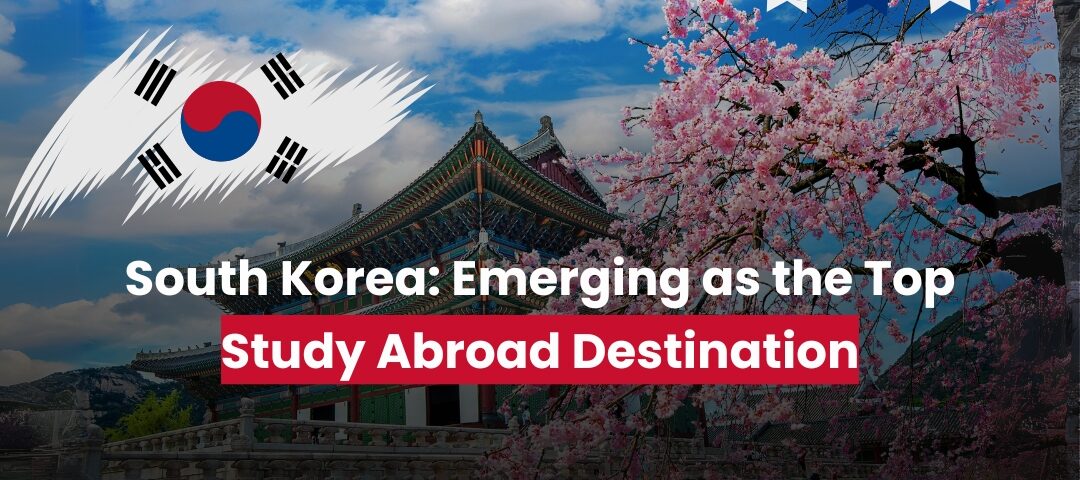
How many hours can you work as an international student in Canada?
13 November 2024
New International Student Program regulations
16 November 2024South Korea: Emerging as the Top Study Abroad Destination
Approximately 1,500 Indian students are enrolled in Korean universities, marking a notable shift from traditional study abroad destinations. South Korea’s cultural allure has made it a viable alternative to countries like the US, Canada, UK, Australia, and New Zealand, benefiting both Indian students and addressing South Korea’s demographic challenges. Thousands of Indians reside in South Korea, with many pursuing education there. Beyond Seoul, universities actively recruit Indian students, supported by provincial governors’ visits to India.
South Korea’s education appeal stems from its excellent infrastructure, reasonable tuition fees, and prestigious institutions like Seoul National University and Korea University. Affordable rental rates and various scholarships make studying in South Korea financially feasible for Indian students. Eligibility criteria for programs and scholarship details are provided, along with insights on living costs. The country’s welcoming environment and support for international students enhance its appeal as an ideal education destination for Indian students.
Suddenly, the South Koreans seem to be all over the place. K Dramas, K pop, K beauty, K food, all things Korean have become the “In thing” for the young and restless in India. With the west saturated, South Korea has offered a novelty in almost everything that matters, including education.
Prabhjot Kaur, a Class X student in a leading Mohali school, is one of the millions hooked to K-pop. The fascination has spilled over to the Korean language as well, which she learned in school. She dreams of going to South Korea for higher education. It is a sentiment shared by many Indian students these days.
Aadhira Menon, a Class XII student in Ernakulam, Kerala surprised her parents when she asked them to stop looking for universities in Canada for her. She announced that she would pursue medicine in South Korea, Seoul, to be precise. The announcement was met with resistance but she prevailed and is in the process of seeking admission in South Korea.
According to a report in the print.in, nearly 1,500 Indian students are enrolled in Korean universities. Although the number may not seem large, especially as compared to students from other countries like China and Nepal who are pursuing higher education in Korea, it does show a significant change.
It seems that South Korea’s cultural appeal has helped it position itself as a viable educational destination for Indian students who have traditionally been enamoured with the US, Canada, UK, Australia and New Zealand. For Indian students, South Korea has come up as a viable alternative to these countries. For South Korea, this provides a solution to its aging workforce and dwindling birth rate.
Indians in South Korea
According to data from the external affairs ministry, there were 13,585 Indians living in South Korea till October 2023. Of these, 349 were persons of Indian origin while the rest were NRIs. Also, many Indians working with multi-national companies visit South Korea on employment visas for one to three years. Even though the South Korean embassy pegged the number of Indian students in South Korea at 1,500, the non-profit organization, Indian Students and Researchers in Korea, claims that the number could be 3,500 for the 2023-24 session.
Besides universities in Seoul, institutions in the rest of the country also seem to be keen on attracting Indian students. Governors of Gyeonggi and Gyeongsangbuk provinces visited India last year for student recruitment among other things, said theprint.in.
The South Korean ambassador to India, Chang Jae-bok underlined the importance of education in bilateral relations during a press interaction recently. “The future of our relations depends on educational cooperation. We already have many students, teachers and scholars between our two countries. I can see a bright future ahead of us whenever I interact with young Indians who are studying in Korea,” he said.
Why is South Korean education catching on?
According to the sources, South Korea’s excellent educational infrastructure draws Indian students in. However, that is not all. As compared to exorbitant university fees in countries like the US, UK and Canada, South Korea offers reasonable tuition fees, besides a welcoming culture. The country has educational institutions known internationally for the quality of education they offer. A few examples are Seoul National University, Korea University and Pohang University of Science and Technology. The tuition fee in undergraduate programmes is around $1,500 to $2,600 while postgraduate programmes have tuition fees ranging from $1,600 to $10,000.
Also, rentals are relatively affordable. A studio apartment in the capital, Seoul, may be available for monthly rent of 400$ and upwards.
Scholarships in South Korea
There are two kinds of scholarships offered in South Korea: University funded and externally funded. University funded scholarships are awarded directly by universities and colleges while external scholarships are awarded by an agency outside colleges or universities.
University funded scholarships
Some of the university funded scholarships are as following:
KNU International Graduate Scholarship is awarded by Kyunpook National University. It offers a 50 to 100% tuition fee waiver and is available for masters and doctoral programmes.
Yonsei University for undergraduate programmes is awarded by Underwood International College of Yonsei University and is available on merit based, admission based and need-based categories.
Korea University’s Graduate School of International Studies scholarship is awarded by Korea University and offers partial or full tuition coverage.
The Changwon National University Scholarship is awarded by Changwon National University. The one-semester scholarship is based on evaluation results and offers 70%, 50% or 30% tuition fee waiver.
The Hanyang University offers the Hanyang International Excellence Awards based on evaluation results. It also offers 70%, 50% or 30% tuition fee waiver. The scholarship is awarded for one semester.
Externally funded scholarships
The externally funded scholarships are as following:
The Korean Government Scholarship programme (Global Korea Scholarship) is awarded by the Korean Ministry of Education and offers fully funded tuition fees with accommodation.
Graduate Student Scholarship-Korea Foundation for Advanced Studies (KFAS) Scholarship is offered by the Korea Foundation for Advanced Studies for masters and doctoral programmes.
The Samsung Global Hope Scholarship Programme is offered for Asian students from DAC list countries. It offers full tuition fees and stipend.
Eligibility criteria
For undergraduate courses in South Korea, aspirants need to have cleared Class XII while for postgraduate courses, aspirants should have a bachelor’s degree. For PhD, aspirants should have a masters degree. Those applying for English-taught courses will need to provide TOEFL or IELTS scores while those applying for Korean-taught programmes need to appear for the Test of Proficiency in Korean (TOPIK). The TOPIK scores have to be attached with the application. Also, aspirants need to furnish letters of recommendation, statement of purpose, CVs and medical records.
Cost of living
The per semester cost of dormitories in South Korea is around Rs 49,414 to Rs 1.14 lakh. A boarding house would cost around Rs 24,570 to Rs 49,414. Rented apartments would be available for around Rs 25,000. These costs may vary from city to city. Besides, there may be variations on the basis of the number of people sharing accommodation, food services etc. Also, miscellaneous expenses like transport would total around Rs 30,000 to Rs 40,000.
In universities oriented towards admission of international students, 30% of lectures are conducted in the English language. Generally, graduate programmes have more lectures in English than undergraduate courses. In a few universities, all courses are taught in English. Students can also enroll in Korean language courses before the academic session, which generally starts in March for the Spring season and in September for Fall.
A warm environment
Although studying in South Korea is a relatively new trend among Indian students, aspirants need not develop cold feet. The country is known to be quite safe for international students. It also provides a conducive environment for both work and study. Besides, Korean students are open to international students, who they treat with hospitality. All in all, South Korea can prove to be an ideal destination for Indian students.


